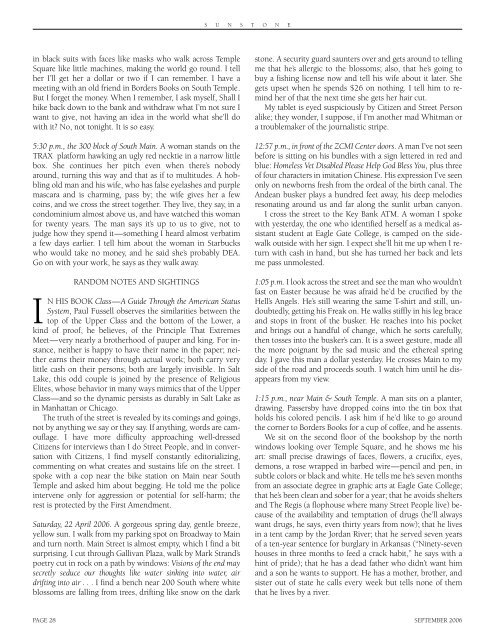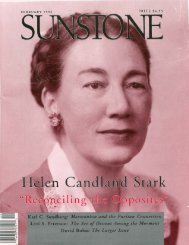00a_cover cmyk dark blue.qxp - Sunstone Magazine
00a_cover cmyk dark blue.qxp - Sunstone Magazine
00a_cover cmyk dark blue.qxp - Sunstone Magazine
You also want an ePaper? Increase the reach of your titles
YUMPU automatically turns print PDFs into web optimized ePapers that Google loves.
S U N S T O N E<br />
in black suits with faces like masks who walk across Temple<br />
Square like little machines, making the world go round. I tell<br />
her I’ll get her a dollar or two if I can remember. I have a<br />
meeting with an old friend in Borders Books on South Temple.<br />
But I forget the money. When I remember, I ask myself, Shall I<br />
hike back down to the bank and withdraw what I’m not sure I<br />
want to give, not having an idea in the world what she’ll do<br />
with it? No, not tonight. It is so easy.<br />
5:30 p.m., the 300 block of South Main. A woman stands on the<br />
TRAX platform hawking an ugly red necktie in a narrow little<br />
box. She continues her pitch even when there’s nobody<br />
around, turning this way and that as if to multitudes. A hobbling<br />
old man and his wife, who has false eyelashes and purple<br />
mascara and is charming, pass by; the wife gives her a few<br />
coins, and we cross the street together. They live, they say, in a<br />
condominium almost above us, and have watched this woman<br />
for twenty years. The man says it’s up to us to give, not to<br />
judge how they spend it—something I heard almost verbatim<br />
a few days earlier. I tell him about the woman in Starbucks<br />
who would take no money, and he said she’s probably DEA.<br />
Go on with your work, he says as they walk away.<br />
RANDOM NOTES AND SIGHTINGS<br />
IN HIS BOOK Class—A Guide Through the American Status<br />
System, Paul Fussell observes the similarities between the<br />
top of the Upper Class and the bottom of the Lower, a<br />
kind of proof, he believes, of the Principle That Extremes<br />
Meet—very nearly a brotherhood of pauper and king. For instance,<br />
neither is happy to have their name in the paper; neither<br />
earns their money through actual work; both carry very<br />
little cash on their persons; both are largely invisible. In Salt<br />
Lake, this odd couple is joined by the presence of Religious<br />
Elites, whose behavior in many ways mimics that of the Upper<br />
Class—and so the dynamic persists as durably in Salt Lake as<br />
in Manhattan or Chicago.<br />
The truth of the street is revealed by its comings and goings,<br />
not by anything we say or they say. If anything, words are camouflage.<br />
I have more difficulty approaching well-dressed<br />
Citizens for interviews than I do Street People, and in conversation<br />
with Citizens, I find myself constantly editorializing,<br />
commenting on what creates and sustains life on the street. I<br />
spoke with a cop near the bike station on Main near South<br />
Temple and asked him about begging. He told me the police<br />
intervene only for aggression or potential for self-harm; the<br />
rest is protected by the First Amendment.<br />
Saturday, 22 April 2006. A gorgeous spring day, gentle breeze,<br />
yellow sun. I walk from my parking spot on Broadway to Main<br />
and turn north. Main Street is almost empty, which I find a bit<br />
surprising. I cut through Gallivan Plaza, walk by Mark Strand’s<br />
poetry cut in rock on a path by windows: Visions of the end may<br />
secretly seduce our thoughts like water sinking into water, air<br />
drifting into air . . . I find a bench near 200 South where white<br />
blossoms are falling from trees, drifting like snow on the <strong>dark</strong><br />
stone. A security guard saunters over and gets around to telling<br />
me that he’s allergic to the blossoms; also, that he’s going to<br />
buy a fishing license now and tell his wife about it later. She<br />
gets upset when he spends $26 on nothing. I tell him to remind<br />
her of that the next time she gets her hair cut.<br />
My tablet is eyed suspiciously by Citizen and Street Person<br />
alike; they wonder, I suppose, if I’m another mad Whitman or<br />
a troublemaker of the journalistic stripe.<br />
12:57 p.m., in front of the ZCMI Center doors. A man I’ve not seen<br />
before is sitting on his bundles with a sign lettered in red and<br />
<strong>blue</strong>: Homeless Vet Disabled Please Help God Bless You, plus three<br />
of four characters in imitation Chinese. His expression I’ve seen<br />
only on newborns fresh from the ordeal of the birth canal. The<br />
Andean busker plays a hundred feet away, his deep melodies<br />
resonating around us and far along the sunlit urban canyon.<br />
I cross the street to the Key Bank ATM. A woman I spoke<br />
with yesterday, the one who identified herself as a medical assistant<br />
student at Eagle Gate College, is camped on the sidewalk<br />
outside with her sign. I expect she’ll hit me up when I return<br />
with cash in hand, but she has turned her back and lets<br />
me pass unmolested.<br />
1:05 p.m. I look across the street and see the man who wouldn’t<br />
fast on Easter because he was afraid he’d be crucified by the<br />
Hell’s Angels. He’s still wearing the same T-shirt and still, undoubtedly,<br />
getting his Freak on. He walks stiffly in his leg brace<br />
and stops in front of the busker. He reaches into his pocket<br />
and brings out a handful of change, which he sorts carefully,<br />
then tosses into the busker’s can. It is a sweet gesture, made all<br />
the more poignant by the sad music and the ethereal spring<br />
day. I gave this man a dollar yesterday. He crosses Main to my<br />
side of the road and proceeds south. I watch him until he disappears<br />
from my view.<br />
1:15 p.m., near Main & South Temple. A man sits on a planter,<br />
drawing. Passersby have dropped coins into the tin box that<br />
holds his colored pencils. I ask him if he’d like to go around<br />
the corner to Borders Books for a cup of coffee, and he assents.<br />
We sit on the second floor of the bookshop by the north<br />
windows looking over Temple Square, and he shows me his<br />
art: small precise drawings of faces, flowers, a crucifix, eyes,<br />
demons, a rose wrapped in barbed wire—pencil and pen, in<br />
subtle colors or black and white. He tells me he’s seven months<br />
from an associate degree in graphic arts at Eagle Gate College;<br />
that he’s been clean and sober for a year; that he avoids shelters<br />
and The Regis (a flophouse where many Street People live) because<br />
of the availability and temptation of drugs (he’ll always<br />
want drugs, he says, even thirty years from now); that he lives<br />
in a tent camp by the Jordan River; that he served seven years<br />
of a ten-year sentence for burglary in Arkansas (“Ninety-seven<br />
houses in three months to feed a crack habit,” he says with a<br />
hint of pride); that he has a dead father who didn’t want him<br />
and a son he wants to support. He has a mother, brother, and<br />
sister out of state he calls every week but tells none of them<br />
that he lives by a river.<br />
PAGE 28 SEPTEMBER 2006

















